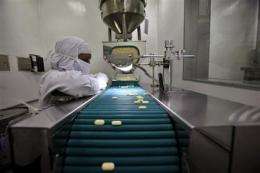India licenses generic copy of patented Bayer drug

(AP) -- India effectively ended Bayer's monopoly on a patented cancer drug Monday, licensing a much cheaper generic under a unique law aimed at keeping costs affordable.
In a decision likely to upset Western pharmaceuticals, the patent office approved Natco Pharma Ltd.'s application to produce the kidney and liver cancer treatment sorefinib.
Bayer Corp. - a subsidiary of the German pharma giant in Pittsburgh, Pennsylvania - markets sorefinib as Nexavar for about $5,600 a month in India under a 2008-2020 patent, making it "not available to the public at a reasonably affordable price," the patent office ruled.
"A right cannot be absolute," it said. The office can force companies to grant licenses to generics in cases of public emergency or where they can show patented products are priced out of reach.
Natco said its version would cost Indian patients $175 a month.
It was the first case of compulsory licensing under India's unique patent laws passed in 2005. Under the license Natco must pay 6 percent in royalties to Bayer.
Western pharmaceutical companies have been pushing for stronger patent protections and rules to clamp down on a $26 billion Indian generics industry they say is overstepping intellectual property rights. Aid groups counter that Indian generics are a lifesaving resource for patients in poor countries who cannot afford Western prices to treat diseases like cancer, malaria and HIV.
"We are disappointed about this decision," Bayer spokeswoman Sabina Cusimano said from Berlin, adding that the company was considering a legal challenge. "We will see if we can further defend our intellectual property rights in India."
Natco's general manager said the drug was needed by about 8,800 cancer patients in India today.
"This is a victory for Indian patients and for India's generic manufacturers, which are under attack," Madineedi Adinarayana said by telephone from the company's offices in Hyderabad.
Bayer's patent "was not working as a patent in India," he said, and predicted "many more such cases will follow."
A patent must be at least 3 years old before a generics company can apply for a compulsory license. Still, many Indian companies have been reluctant to push for compulsory licenses where they might jeopardize agreements to manufacture other drugs for wealthy Western drug companies.
Analysts and patient advocacy groups said the ruling could have wider implications for the pharmaceutical business worldwide.
"This is a rare instance where a general compulsory license has been issued, not bound by government use provisions or those requiring to show 'extreme urgency' or 'emergency," said Dr. Amit Sengupta of the People's Health Movement. The license given to Natco "without encumberances means a possible opening of opportunities for using compulsory licenses to promote competition."
Lawyer Anand Grover for the Cancer Patients Aid Association, who was not involved in arguing the Nexavar case, said the ruling should force foreign drug companies to be mindful of Indian market realities. "It would be interesting to see whether multinationals will change their practices" in developing countries, he said.
India's generics industry has been a focus in recent months with several Western pharmaceutical giants saying the 2005 Patent Act fails to guarantee investors' rights.
Swiss drug maker Novartis AG is now in the final stages of a Supreme Court case to overturn India's patent rejection on another cancer drug, Gleevec. That case revolves around a different legal provision allowing India to block "evergreening" - or patents and extensions based on minor changes to existing treatments.
Lawyers, generic drug makers and aid groups like Medecins Sans Frontieres and Oxfam have also warned that ongoing free-trade talks between India and the European Union are threatening India's generics production with discussions about tightening intellectual property protections and making it easier for pharma giants to sue India's government, drug manufacturers and distributors. They say the EU's suggesting a clause to ensure nothing limits India's ability to produce and export lifesaving medicines is not enough of a guarantee.
©2012 The Associated Press. All rights reserved. This material may not be published, broadcast, rewritten or redistributed.















